
Digital technologies offer young women and men innovative ways to get involved in politics. From receiving instant news notifications on political developments, to engaging in online debates and expressing opinions on social media, political and civic participation has become faster and easier. Yet, one of the downsides experienced by this generation, who is the most digitally skilled in the EU, is the risk of online abuse. These are some of the findings published today by the European Institute for Gender Equality (EIGE). The study was prepared at the request of the Austrian Presidency of the Council of the EU.
“Digital spaces can be empowering places of opinion-formation, debate and mobilisation. However, cyberbullying restricts the opportunities offered by digitalisation. Young people, especially women are put off from taking part in political discussions or online debates. All of society is missing out when young women are not engaged because we are losing their potential to get involved in politics and become future leaders,” said Virginija Langbakk, EIGE’s Director.
Online harassment happens more often to young women, with 9 % declaring to be a victim, compared with 6 % of young men. After witnessing or experiencing online hate speech or abuse, one young woman out of two (51 %) and 42 % of young men hesitate to engage in social media debates.
“The internet needs to be a safe place to enable young people to express their opinions. Cyber bullying or abuse has to be prevented if we want to ensure the full online participation of youth, especially young women, whose voices are less heard,“ said Juliane Bogner-Strauss, Austrian Minister for Women, Families and Youth.
Young men are more politically active online, with 26 % posting comments on online articles, social networks or blogs, compared to 18 % of young women. Young men, more than young women, see the benefits that social media brings for political participation. Just over half (51 %) of young men and under half (47 %) of young women think that online social networks represent progress for democracy because they give everyone a chance to contribute to public debate.
In light of the upcoming European Parliament elections in May 2019, it is important to encourage young women and men to use digital technology to grow into active European citizens by becoming informed on important topics, engaging in online debates and making their opinions count.
Further information
The report Gender equality and youth: opportunities and risks of digitalisation (forthcoming) was prepared at the request of the Austrian presidency. It explores how digital technologies can be used to promote gender equality and what are the gender-related risks of digitalisation for young women and men.
For more information, read our factsheets on Gender equality and youth: opportunities and risks of digitalisation and Gender equality and digitalisation in the European Union.
For more information, please contact Bernadette Gemmell, phone + 370 5215 7426 or email: bernadette.gemmell@eige.europa.eu
Follow us on Facebook and Twitter for more updates and news.
Subscribe to our monthly newsletter.
Image copyright: mimagephotography/Shutterstock.com




